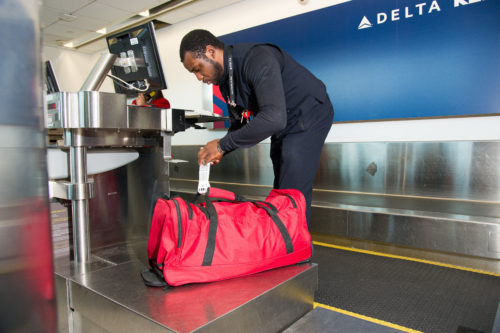With airlines charging checked bags fee, travelers have a stronger reason to be concerned if their bags arrive on time. Delta handles 120 million bags per year, and they already have a pretty good track record. Only 1 in 500 bags arrive late, but they are trying to make sure they keep improving in this area.

Traditionally, bag tags contain a barcode that is scanned every time a bag is loaded onto a plane. However, that requires manual labor, and with that comes potential for mistakes. Radio-frequency identifications (RFIDs), on the other hand, are detected remotely. If you have used a tag on a toll road, or have used a proximity card to access a building/room, you have already used RFID technology!
Earlier in the year, Delta has announced that they are adding RFID chips to bag tags in an effort to prevent lost mishandled luggages. When bags are loaded onto or unloaded from a flight, the RFIDs get read by sensors in special belt loaders. A bag headed to the right place will trigger a green light, or a red light if it’s going down the wrong belt.
When bags are loaded onto or unloaded from a flight, the RFIDs get read by sensors in special belt loaders. A green light flashes if the bag is headed to the right place, and red if it is going down the wrong belt.
Today, Delta provided an update as to which airports will receive this enhancement. 1,500 specialized belt loaders are being deployed in 84 of the largest airports in Delta’s network. You can check whether your home report is receiving this new technology here.
Of course, this is not going to solve all baggage issues. But Delta is anticipating a 10% reduction in lost mishandled bags, according to a report from USA Today.
As much as I try to avoid checking bags, this is great news for all travelers.
Is your home airport getting the technology?
The responses below are not provided or commissioned by the bank advertiser. Responses have not been reviewed, approved or otherwise endorsed by the bank advertiser. It is not the bank advertiser's responsibility to ensure all posts and/or questions are answered.